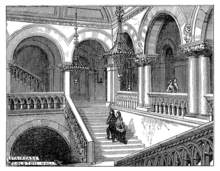This is an old revision of this page, as edited by 82.33.89.34 (talk) at 13:25, 17 October 2010 (added Alesha Dixon to artists who have performed). The present address (URL) is a permanent link to this revision, which may differ significantly from the current revision.
Revision as of 13:25, 17 October 2010 by 82.33.89.34 (talk) (added Alesha Dixon to artists who have performed)(diff) ← Previous revision | Latest revision (diff) | Newer revision → (diff)| Colston Hall | |
|---|---|
 Engraving of the exterior, from 1873. Engraving of the exterior, from 1873. | |
 | |
| General information | |
| Town or city | Bristol |
| Country | England |
| Completed | 1860s |
| Client | Corporation of Bristol |
Colston Hall is a concert hall situated on Colston Street, Bristol, England. A popular venue catering for a variety of different entertainers, it seats approximately 2,075 and provides a licensed bar.
History
The site has been occupied by four buildings named as such since the 1860s. In the thirteenth century, the site was occupied by a Carmelite friary, known as Whitefriars. Subsequently, the location held a large Tudor-era mansion known as the Great House, used by Queen Elizabeth I in 1574 on a visit to the city. In 1707, Edward Colston established the Colston Boys' School in this building, which was acquired by the Colston Hall Company in 1861. Colston Hall opened as a concert venue on September 20, 1867. The architects were the prolific Bristol firm of Foster & Wood working in the Bristol Byzantine style. It has been designated by English Heritage as a grade II listed building.

Most of the building was damaged during a fire on September 1, 1898; the auditorium suffered immense structural damage, and the interior was more or less destroyed. The second hall opened in 1901, and in 1919, the Corporation of Bristol purchased it from the Colston Hall Company. The City Council continues to manage the hall. The second hall was closed for remodelling in 1935.
In December 1936, the third hall was opened. This survived the Luftwaffe air raids of the Second World War, but was burned down in 1945 after a discarded cigarette started a fire. The hall was rebuilt once more, and the fourth reopened in 1951 to mark the Festival of Britain. The first computerised booking system was installed in February 1983, and a £500,000 modernisation programme was conducted at the start of the 1990s, which included extensive rewiring, and various backstage improvements. The installation of removable seating in the front half of the stalls in 2005 improved the hall as a venue for pop concerts, providing space for fans to move around and dance in front of the stage; it also increased the overall capacity of the auditorium.
Campaigners, many from the city’s Afro-Caribbean community, have called for the hall’s name to be changed because of Edward Colston’s link to the slave trade. The Bristol group Massive Attack vowed not to play at the venue while it retained its present name. The proposal sparked a heated controversy in the pages of the local press, although the majority of letters printed favoured retaining the Colston name.
The hall is currently undergoing extensive refurbishment in the form of a new foyer building alongside the present building.
Artists who have performed at Colston Hall
The venue has played host to many well-known acts over the years. These include:
- a-ha - January 1987
- Alesha Dixon - 4th November 2009
- Count Basie
- The Beatles - March 1963 and November 1964.
- David Bowie - February and October 1969 and June 1972
- Bob Dylan - May 1966 He also used the Colston Hall to film the concert scenes for his 1987 film Hearts of Fire.
- Duke Ellington
- Jimi Hendrix - November 1967
- Elton John
- Led Zeppelin - June 1969 and January 1970.
- Bob Marley & The Wailers
- Ozzy Osbourne - 1980 and 1981
- Pink Floyd - June 1966
- Queen - November 1973, supporting Mott the Hoople, November 1974 and November 1975
- Lou Reed
- The Rolling Stones - October 1966 (Three tracks from their album Got Live If You Want It! album were recorded at this concert) and 1971.
- Roxy Music
- Thin Lizzy
- Robbie Williams
- U2 - March 1983
References
- Colston Hall Technical Information, Official Web Site
- ^ History of Colston Hall (1200s-1800s), Official Web Site
- "The Colston Hall". Philharmonic Orchestra. Retrieved 2007-05-19.
- "The Colston Hall". Images of England. Retrieved 2007-03-13.
- ^ History of Colston Hall (1900s-1930s), Official Web Site
- History of Colston Hall (1940s), Official Web Site
- History of Colston Hall (1950s), Official Web Site
- ^ "History of Colston Hall 1960s". Colston Hall. Retrieved 27 April 2010.
- ^ History of Colston Hall (1990s), Official Web Site
- Colston Hall – New Foyer Development
- http://www.colstonhall.org/aboutthehall/history/history8
- http://a-ha.com/tour/#1987
- ^ "Colston Hall 1960s". Colston Hall. Retrieved 27 April 2010.
- "David Bowie Concerts 1958 to 1969". bowiewonderworld.com. Retrieved 27 April 2010.
- "David Bowie Concerts 1972". bowiewonderworld.com. Retrieved 27 April 2010.
- ^ "Colston Hall 1970s". Colston Hall. Retrieved 27 April 2010.
- "Bob Dylan Colston Hall". Bob Dylan official website. Retrieved 27 April 2010.
- "Concert timeline June 21, 1969". Led Zeppelin official website. Retrieved 27 April 2010.
- "Concert timeline January 8, 1970". Led Zeppelin official website. Retrieved 27 April 2010.
- "Seeing Stars - October 1980". Bristol Evening Post. 20 October 2009. Retrieved 16 July 2010.
- http://home.flash.net/~ulknatme/tourdate.htm
- "1969 tour dates/concerts". Brain Damage. Retrieved 27 April 2010.
- http://www.queenconcerts.com/detail/live/61/queen-live-29-11-1973-colston-hall-bristol-uk.html
- http://www.queenconcerts.com/detail/live/126/queen-live-12-11-1974-colston-hall-bristol-uk.html
- "Queen live on tour: A Night At The Opera". Queen Concertography. Retrieved 27 April 2010.
- "Ticket stub: 18.11.1975". Queen Concertography. Retrieved 27 April 2010.
- "RollingStones.com archive". The Rolling Stones. Retrieved 27 April 2010.
- http://www.colstonhall.org/aboutthehall/history/history8
- "The War Tour". U2 official website. Retrieved 29 May 2010.

